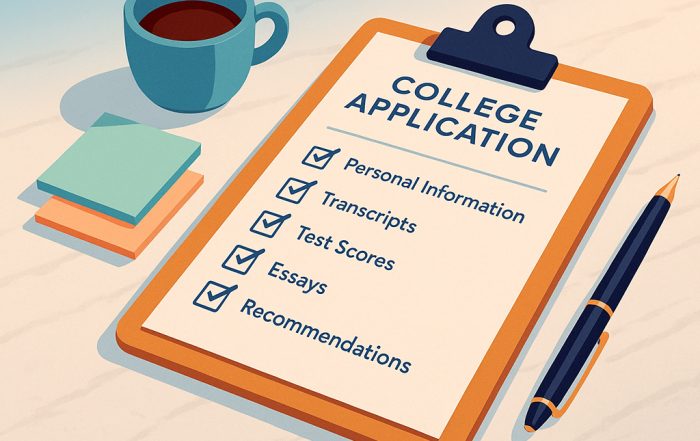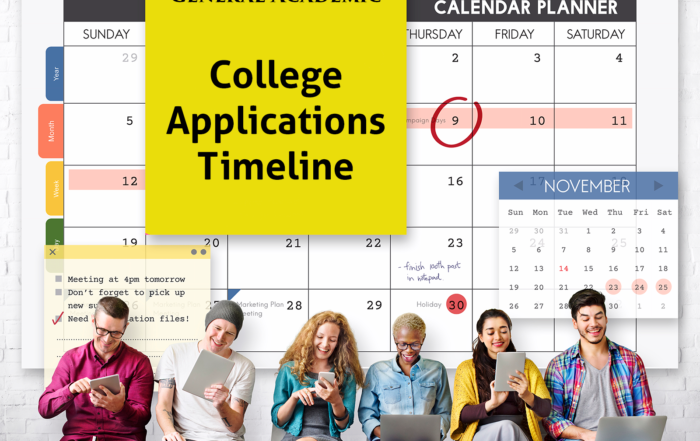College Counseling Rates and Packages
Hourly
Students seeking targeted helpThis flexible option lets you purchase counseling hours on an as-needed basis. It’s perfect if your student needs targeted support at specific stages of the application process without committing to a full package.
They can access expert guidance exactly when needed—whether it’s brainstorming their college vision or polishing their personal essay. Plus, if your student later realizes they need more help than originally anticipated, we will gladly prorate your upgrade to a package.
Honors Package
Students applying to 5-8 schools, all-inclusiveOur Honors Package is a bundled service that offers a structured approach to college counseling. It’s designed for students looking for a balanced level of support, providing a comprehensive set of services at an effective rate.
With this package, your student receives a curated plan covering key aspects of the admissions process—from application strategy to interview preparation—ensuring a strong and cohesive application.
Advanced Package
Students applying to 9+ schools, all-inclusiveThe Advanced Package is our most extensive offering, crafted for highly competitive applicants aiming for top-tier institutions. It delivers in-depth, personalized counseling across all facets of the admissions journey.
This package includes detailed assistance with essay writing, scholarship searches, and interview coaching, as well as 10 hours of private tutoring or SAT/ACT test prep, ensuring your student has every advantage in presenting their best self to admissions committees.
Steps in the College Applications and Admissions Process
Our brilliant, certified college counselors help students with all six primary components of college applications:
- Crafting your unique vision and personal brand.
- Building and maintaining a strong academic profile.
- Researching colleges and managing application logistics.
- Writing and refining compelling essays.
- Coordinating application materials and recommendations.
- Evaluating offers and strategizing financials.
Vision Crafting & Personal Branding
Articulate the student’s unique story, values, and future goals as the foundation for their entire application.
Key Services
- Personal Vision Development
- Facilitate sessions to uncover key experiences and long‑term goals.
- Unique Value Proposition Creation
- Define and refine the student’s “sales pitch” that differentiates them.
- Narrative Cohesion
- Integrate extracurriculars and achievements into a consistent, authentic story.
- Digital Presence Optimization
- Audit and align the student’s online profiles and social media with their personal narrative to reinforce their brand.
Academic Profile & Growth
Build and maintain a competitive academic profile that reflects both current success and future potential.
Key Services
- Transcript & Course Strategy Review
- Evaluate academic records and course selections to strengthen the overall profile.
- Goal Setting & Progress Monitoring
- Establish clear benchmarks and track ongoing improvement.
- Study & Time Management Coaching
- Provide tailored strategies to sustain high performance.
- Admissions Narrative Integration
- Align academic achievements with the broader application story.
College Research & Application Timeline
Strategically identify and organize college options, manage deadlines, and handle logistics.
Key Services
- Options Assessment
- Conduct research to gather necessary data for creating large pool of possible college options.
- College List Refinement & Comparison
- Systematically narrow down options into safety, match, and reach categories.
- Timeline & Deadline Management
- Create and maintain a detailed schedule for all application milestones.
Essay Writing & Editing Support
Guide students through every step of crafting and polishing essays that authentically showcase their story.
Key Services
- Brainstorming & Drafting Sessions
- Spark ideas and create structured outlines for the Common App and supplemental essays.
- Iterative Revision & Feedback
- Offer detailed, step‑by‑step critiques to refine content and style.
- Final Polishing & Consistency Checks
- Ensure essays align with the overall narrative and meet application requirements.
Application Assembly & Process Coordination
Oversee and integrate all application components to create a seamless, polished final package that is submitted on time.
Key Services
- Materials Organization & Checklist Management
- Oversee the collection and arrangement of transcripts, test scores, and other documents.
- Recommendation Letter Coordination
- Assist in securing and tracking timely, strong letters of recommendation.
- Final Quality Control Reviews
- Conduct comprehensive pre‑submission checks to minimize errors and omissions.
Decision Making & Financial Strategy
Assist students and families in evaluating college offers and financial aid packages to make an informed enrollment decision.
Key Services
- Financial Aid & Scholarship Analysis
- Break down offers, grants, loans, and scholarship options for clear comparison.
- Offer Comparison & Decision Framework
- Provide structured tools and guidance for weighing overall fit and cost.
- Final Enrollment Guidance
- Support the final notification process and transition planning for college enrollment.
College Admissions Timeline
A student’s college readiness journey starts as early as Kindergarten, where lifelong learning habits and academic resilience take root. But when it comes to crafting the formal application itself, that process begins in the summer before or during the fall semester of 11th grade.
Applying to college is essentially a parttime job – one that your child takes on in addition to their fulltime job as a student. But it does not have to be a burden; instead, it can be a joyful exercise of growth and success. The secret? A dedicated, personal, private college counselor to advise your child every step of the way.
Research shows that the benefits of a private college admissions counselor are vast: from providing structure and alleviating anxiety, to saving countless hours of precious time. A typical student who starts working with a counselor during the middle of their high school career can expect to save as many as 200 hours over the course of applying to college.
Want to learn more? Click here to read about the College Application Timeline for Texas Students.
- Start studying for PSAT, SAT, and ACT
- Attend college fairs
- Research scholarship and financial aid opportunities
- Explore potential career pathways through internships, volunteering, or job shadowing
- Begin developing and expanding extracurricular activities or community service efforts
- Start scheduling initial visits to nearby colleges/universities
- Take the PSAT/NMSQT (typically in October) for scholarship eligibility and test prep
- Meet with a school counselor or academic adviser for guidance
- Continue standardized test preparation; register for SAT or ACT
- Take the SAT or ACT at least once; consider retakes for higher scores
- Begin serious exploration of college options (determining safety, target, and reach schools)
- Request recommendation letters from teachers, counselors, and/or coaches
- Research specific admission requirements and timelines for schools on your list
- Start drafting a personal statement or essay topics
- Develop a resume or activity list listing extracurriculars, leadership roles, and service hours
- Register and plan AP exams if appropriate
- Discuss finances and budgeting expectations with family
- Visit colleges to get an in-person feel, attend information sessions, and campus tours
- Narrow down your list of colleges to your final shortlist (target, likely, and reach)
- Create an organized system or list to track application materials, deadlines, and essay prompts
- Begin completing college applications (Common Application, Coalition Application, or individual school applications)
- Draft and revise the primary personal essay and supplemental essays
- Continue researching and applying for scholarships
- Confirm standardized test scores were sent or prepare to request official transcripts/test scores in the fall
- Create or refine your online professional footprint (LinkedIn, personal portfolios, or creative websites, if applicable)
- Write supplemental essays for individual colleges
- Finalize and submit applications (Early Decision, Early Action, and Regular Decision)
- Confirm counselor sends transcripts and recommendation letters to schools
- Verify that SAT/ACT and AP Test scores have been officially sent
- Complete and submit FAFSA and CSS Profile (where applicable) for financial aid
- Seek opportunities to demonstrate interest with colleges (interviews, campus visits, open houses, webinars, virtual tours)
- Prepare for and complete college interviews, if requested or recommended
- Keep track of college admission decisions and monitor admission portals
- Visit or revisit colleges to aid decision-making process
- Submit updates, follow-up materials, mid-year grades, and letters of continued interest if placed on waitlists or deferred from early rounds
- Review and compare financial aid packages; appeal if necessary and consider affordability
- Make the final enrollment decision by May 1st (National Decision Day)
- Notify all other colleges of your decision; withdraw pending applications politely
- Submit enrollment deposit, housing registration, orientation registration, and other enrollment paperwork/processes
- Celebrate your accomplishments and finish senior year strong academically
- Complete housing and meal plan arrangements
- Register and attend orientation programs
- Register for courses and select a schedule
- Connect with future classmates online or through orientation events
- Solidify plans for financing college (scholarships, loans, employment, budgeting, etc.)
Save Time with a College Counselor
General Academic’s college counselors can easily reduce the time required to complete college applications by half. Click here to read more about the many benefits that come from working with a college admissions consultant.
College Admissions FAQs
College admissions officers assess applications holistically, meaning they evaluate the “whole” student. No factor (including grades, test scores, or extracurriculars) is considered in a vacuum; rather, these pieces are all assessed in the context of each student’s unique background.
With that being said, a student’s academic record (including their grades and course selections) tend to be the most important part of each application. College vary in terms of which factors they consider and how they weigh them; most colleges provide insight into these factors on their Common Data Set document (try searching the web for “[College Name] + Common Data Set”).
Every high school has a different way of calculating grades, which makes it difficult to use GPA as a metric for college admissions. Some colleges provide aggregate GPA data for recently admitted students, but this is nowhere near as widely available as test score data.
Some colleges standardize GPA themselves through a recalculation process, which can provide a clearer point of comparison for students. Others focus on holistic review of student transcripts, with an emphasis of rigor of curriculum – that is, they primarily care about which courses your student took, how challenging those courses are relative to what was available to them, and what grade is next to each course on the transcript.
Many colleges switched to a test-optional policy with the onset of COVID-19. However, some colleges (including MIT) have switched back to a test-required policy, so we’d recommend checking the requirements of each university on your college list. On the opposite end of the spectrum, a handful of colleges have committed to a test-blind policy (including the University of California system), meaning that they are removing test scores from consideration entirely.
In general, we do recommend preparing for either the SAT or ACT, even if many of your student’s target colleges are test-optional. If a student can achieve a score that falls near or above the median for typical students admitted to any given college, then submitting scores will only serve to benefit them. Your student can also always choose to submit their score to some schools and withhold them from others.
Most students succeed with 8 – 12 well-researched schools: 2 – 3 safeties, 3 – 5 matches, and 2 – 3 reaches. Highly accomplished students might consider applying to a higher proportion of reach schools, but every student should balance out their list with colleges of varied selectivity.
Generally speaking, colleges do not make value judgments about the extracurricular activities a student chooses to pursue. They do, however, value quality over quantity; they look for students who commit to particular activities for the long-term and rise to leadership roles within them.
Ideally, your student’s extracurriculars should reflect their genuine interests and passions. If they sincerely enjoy a particular activity, they’ll have a better time working hard to improve themselves, achieve awards, and maybe earn leadership positions. Extracurriculars are also a great way for students to explore new interests that may grow into passions – or even career paths.
Start exploring interests and building strong academic habits early (even in 9th grade), but formal application prep (essays, resumes, etc.) begins in junior year.
– ED: Binding commitment if accepted (apply to 1 school).
– EA: Non-binding early application (multiple schools).
– RD: Standard deadline (no restrictions).
Yes and no. You can reuse parts of essays or follow similar outlines, but you should always tailor them to each school’s prompts and values. Never mention the wrong college in an essay!
Yes, most colleges and universities absolutely care about demonstrated interest. There are multiple ways to demonstrate interest: attend virtual tours (virtual or in-person), email admissions reps, or engage on social media to show enthusiasm. If you are deferred or waitlisted, consider sending a Letter of Continued Interest.
No, but they show rigor. Focus on excelling in courses available to you.
Yes! Colleges can rescind offers if grades drop significantly.
Submit the FAFSA and/or CSS Profile. Aid is based on need (grants, loans) and merit (scholarships).
Yes! Politely appeal with competing offers or new financial circumstances.
Most colleges don’t require declaring until sophomore year, but your stated major on your application should fit your sales pitch.
The optimal size of college depends on your goals: small = personalized attention; large = more resources/networks.
Authenticity! Share a specific story that reveals your values, growth, or perspective.
They’re rarely decisive but can provide context. Treat them as conversations, not interrogations.
There is nothing wrong with seeking help for essay editing, but the “voice” of the essay must be authentically yours. Avoid over-polishing—admissions officers spot inauthenticity.
The biggest essay mistake is having generic answers (e.g., “I’ve always loved science”) or listing achievements without reflection.
Revisit campuses (ideally, in-person), compare financial aid, talk with current/former students, and—above all—trust your gut.
Attend virtual sessions, visit campus, email regional reps, and reference specific programs in your supplements.
File an appeal with updated documentation such as job-loss notices or medical bills. Most colleges will re-evaluate need-based aid.
Send test scores to test-optional schools when they enhance your application – typically at or above the school’s median. Otherwise, withhold and bolster essays, grades, and course rigor.
Client Testimonials
The whole senior year with the college applications is quite challenging and nerve-wracking for the whole family.
We are very grateful that Mr. Samuel supported our child. We highly recommend General Academic for college counseling!!!
We have been using General Academic for years to prep for high school then college admissions.
He has done fantastic in high school and was admitted to his top choice university. We will be using them again for his younger brother.
Great tutoring services. Comprehensive options available. They meet clients where they are.
General Academic is a wonderful institution. Samuel is an incredible tutor and mentor.
He is very patient with his students and facilitates a calm positive working environment. I highly recommend them!
General Academic saved our family a lot of time and stress during the college application process. From carefully selecting tutors for standardized tests to guiding us through each step of college applications, their personalized support made an overwhelming process feel manageable. With General Academic, I never felt alone.
In the beginning, I was too involved, which definitely didn’t create a peaceful home. Once I turned over managing deadlines to General Academic, everything improved dramatically. General Academic was an incredible help throughout the college application process, truly an invaluable resource for us. We plan to keep using General Academic for our younger children in the years ahead.
I’ve observed that this program’s essay process is far superior to any other I’ve seen. The staff follows strict guidelines to preserve each student’s unique voice and ideas, while providing outstanding support—whether that means managing anxiety, organizing complex experiences, or structuring essays. They truly showcase each student’s strengths and personality for the admissions process.
We had been using General Academic for Algebra 2 and ACT/SAT test prep, and then we sought out help with college application process. We attended a good parent meeting which helped me understand the steps to apply. My husband and I work full time, and we didn’t have a lot of time to help. Meeting with his counselor once a week provided a set time to work on the application process and saved us a lot of time. We were so proud—he was accepted into all the schools he applied to!
The sole purpose of hiring General Academic was because we knew the admissions task was bigger and more daunting than we had time for; trying to do it ourselves would have been stressful and brought lots of push‑back. With our tutor guiding the whole application and essay process, everything was far more streamlined—our role became simply driving her to appointments and making sure deadlines were met. Without that support, the process would never have gone anywhere near as smoothly as it did.






